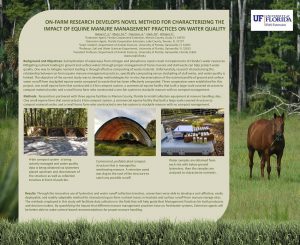1Extension Agent, Florida Cooperative Extension, Marion County, Ocala, FL 34471
2Extension Agent, Florida Cooperative Extension, Lake County, Tavares, FL 32757
3Grad. Student, Department of Animal Sciences, University of Florida, Gainesville, FL 32653
4Professor, Soil and Water Sciences Department, University of Florida, Gainesville, FL 32653
5Assistant Professor, Department of Animal Sciences, University of Florida, Gainesville, Florida 32653
Eutrophication of waterways from nitrogen and phosphorus inputs result in impairments to Florida’s water resources. Mitigating nutrient loading to ground and surface waters through proper management of horse manure and stall waste can help protect water quality. One way to mitigate nutrient loading is through effective composting of waste material. Unfortunately, research characterizing the relationship between on-farm equine manure management practices, specifically composting versus stockpiling of stall waste, and water quality is limited. The objective of the current study was to develop methodologies for in-situ characterization of the nutrient profile of ground and surface water runoff from stockpiled equine waste compared to waste that has been effectively composted. Researchers partnered with three equine facilities to install collection equipment at their manure handling sites. Through the innovative use of lysimeters and water runoff collection trenches, researchers were able to develop a cost-effective, easily deployable, and readily adaptable method for characterizing on-farm nutrient losses in leachate and surface runoff from manure storage sites. The methods employed in this study will facilitate data collection in the field that will help guide Best Management Practices for both producers and decision makers. By quantifying the impact that different manure management practices have on freshwater systems, Extension agents will be better able to make science-based recommendations for proper manure handling.
 0
0

